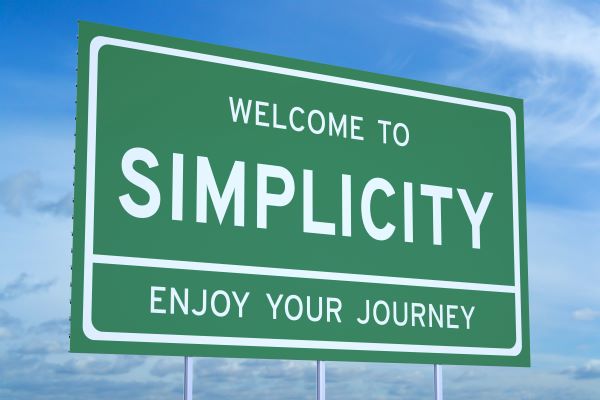Habits of the Heart: A Study of the Spiritual Disciplines
“Simplicity”
By Dr. Jack R. Hodges, Jr.
Burke County
In my previous articles, I wrote about four” Inward” Habits of the Heart or spiritual disciplines that we must pursue in our faith journey to maturity in Christ. As we choose to spiritually discipline ourselves, the Holy Spirit then transforms us into the image of our Savior, the Lord Jesus Christ. Those first four inward habits, Meditation, Prayer, Fasting, and Study are the first four of what has been identified as twelve fundamental spiritual disciplines for the believer. Over the next four months, look with me at the next four “Outward” Spiritual Disciplines that must be practiced in order for God to continue to mold us into the image of His Son. The practice of the outward disciplines is evidence of a maturing relationship with Christ. By faith, we have been reconciled to a new relationship with Christ. But it is only as we mature in Christ will we trade in the worldly trappings of living for self and commit ourselves to live for Christ. As we live for Christ, we take on the character of Christ, allowing the Holy Spirit to produce the Fruit of the Spirit, and only then will we choose to live lives of Simplicity, Solitude, Submission, and Service.
The first outward discipline is “Simplicity.” It is indeed timely that a discussion of simplicity comes up at this particular time when governmental restrictions surrounding the threat of the coronavirus pandemic have become stricter and tighter; and a time when access to goods and services has been diminished and curtailed. The state-wide “stay at home” order mandates that we submit to social distancing guidelines in order to stop the rapid spread of this pandemic. Most of our churches have complied, taking seriously our scriptural responsibility to “submit to higher authorities.” While serious threats to our religious freedoms can be seen around the U.S., I am thankful that we live in a country where the freedom to worship is guaranteed by the U.S. Constitution. As Christians celebrated Easter some weeks ago, albeit, in unique and challenging ways that we have never faced before here in America, the resurrection of Christ reminded us that we are truly free—made spiritually and eternally free by the shed blood of Christ.
Richard Foster (Celebration of Discipline, Harper & Row) describes the Spiritual Discipline of Simplicity as “an inward reality that results in an outward lifestyle.” Lifestyle choices are very personal, and most are very private. Most, if not all, of our choices, are conditioned responses to what we have learned; what we have understood to be true; or what we think that we need in order to survive. So, along with an American culture that has put an extreme value on the rights of individuals, it certainly seems that the average American has become more and more selfish. That sadly includes Christians. Our culture bombards us with powerful messages (e.g., more is better; luxury gives joy and/or happiness; money provides security; entertainment provides rest; etc.). That trap has lured us into the pursuit of more and more things. We have become selfish and self-centered—and in becoming selfish, our hearts are torn away from pursuing a simple life and walk of faith with Christ Jesus.
The Spiritual Discipline of Simplicity is God’s answer to selfish humanity—and it is His demand of us who choose to live for Him and for His glory. Foster further defines simplicity as “the discipline of freeing ourselves from unnecessary excess and self-gratifying luxury.” Isolated and removed from material things during this pandemic has forced all the world’s citizens into simpler lives and lifestyle choices. That may be painful, but it may also function to force us to refocus our hearts and minds upon what is important to God and what is essential to living for Him.
The Bible has a lot to say about riches and as the Word of God deals with the subject of riches, the focal point always has to do with the inner spirit of slavery or idolatry that wealth seems to bring. The Psalmist declared (Ps. 62:10b), “…If riches increase, do not set your heart upon them.” Jesus dealt extensively with the subject of wealth and money. He said (Mark 4:19), “but the worries of the world, and the deceitfulness of riches, and the desires for other things enter in and choke the word, and it becomes unfruitful.” And He warned of living our life driven by riches and pleasures (Luke 8:14), “The seed which fell among the thorns, these are the ones who have heard, and as they go on their way they are choked with worries and riches and pleasures of this life, and bring no fruit to maturity.” He warned in Luke 16:13, “No servant can serve two masters; for either he will hate the one and love the other, or else he will be devoted to one and despise the other. You cannot serve God and wealth.” (Note: “mammon” was the Aramaic expression for money or wealth). He commanded His followers (Matt. 6:19-21), “Do not store up for yourselves treasures on earth, where moth and rust destroy, and where thieves break in and steal. But store up for yourselves treasures in heaven, where neither moth nor rust destroys, and where thieves do not break in or steal; for where your treasure is, there your heart will be also.” To the rich young ruler, Jesus advised for him not only to give up any inward attachment to the possession but also to get rid of his possessions if he wanted to attain the Kingdom of God (Matt. 19:16-22). Jesus counseled all people who came seeking God to (Lk. 12:33-34), “Sell your possessions and give to charity; make yourselves money belts which do not wear out, an unfailing treasure in heaven, where no thief comes near nor moth destroys. For where your treasure is, there your heart will be also.”
What was Jesus saying about wealth and possessions? As Foster wonderfully points out, “He called all who would follow Him to a joyful life of carefree unconcern for possessions.” In Jesus’ own words, He said, “Give to everyone who begs from you; and of him who takes away your goods, do not ask them again.” (Lk. 6:30)
Paul joined in on the same concerns. As he wrote to the churches and counseled the new leaders (i.e., Bishops, pastors, deacons, etc.), Paul declared that a Bishop should not be a “lover of money” (1 Tim. 3:3) and a deacon must not be “greedy for gain” (1 Tim. 3:8). To the Hebrew church, Paul wrote (Heb. 13:5), “Make sure that your character is free from the love of money, being content with what you have; for He, Himself has said, “I will never desert you, nor will I ever forsake you.”
On the other hand, the Bible does not advocate that God’s people are to live in misery and poverty. All of the earth and all that is in it belongs to the Lord, and He desires to make available to His children all that they need. In other words, adequate material provisions are always made available by God to His children. Forced poverty or “asceticism” (the doctrine that a person can attain a high spiritual and moral state by practicing self-denial, self-mortification, and the like) is sinful and evil and is not a part of God’s plan for His people.
Simplicity is not “doing without.” It is not living in a pigsty. It is not living an unhealthy life, not refusing to eat healthily, nor failing to keep our “tabernacles” in good shape. I like how Foster says it, “Simplicity is the only thing that can sufficiently reorient our lives so that possessions can be genuinely enjoyed without destroying us.”
Jesus makes it absolutely clear what the focus of our lives should and must be as we follow Him—seeking the Kingdom of God (cf. Matt. 6:25-33).
We practice the spiritual discipline of simplicity as we choose to seek after the kingdom of God. Admittedly, this is a difficult discipline to grasp as we live in a culture of self and want. Yet God calls His children of faith to “seek ye first the kingdom of God.” Simplicity is about making sure that the stuff in our lives is not allowed to either pile up and become overwhelming or to become idols. May I suggest that when they do overwhelm us or become our idols, then we will begin to both feel and carry anxiety as an indication of our bondage.
Finally, let me pass along some deep wisdom from Richard Foster, who shares that when God’s people are living in freedom from anxiety, then three inner attitudes will be present: (1) If what we have we receive as a gift, and (2) if what we have is to be cared for by God, and (3) if what we have is available to others; then we will possess freedom from anxiety. This is, perhaps, one of the greatest descriptions of the inward reality of simplicity. To know that all that we have is from God is freeing. To know that it is God’s business to care for all that we have is freeing. To know that all of our goods are available to others is freeing. The adverse is, as Foster warns, “If what we have we believe we have gotten, and if what we have we believe we must hold onto, and if what we have is not available to others, then we will live in anxiety.”
God’s children are called to practice the Spiritual Discipline of Simplicity. It is an inward reality that results in an outward lifestyle.” A child of God lives an outward lifestyle of simplicity when he/she makes choices out of freedom, grace, mercy, love, and a commitment to seek first God’s kingdom (His eternal plans and purposes). And that, my brothers, and sisters in Christ, produces peace in a time of fear, trouble, and difficulty. May the peace of God be with you all.
_______________________________________________________________________________
Dr. Jack Hodges is the Senior Pastor at Pleasant Hill Baptist Church in Morganton, NC. He has served as a pastor, a biblical counselor, and an International Mission Board missionary.
______________________________________________________________________________







